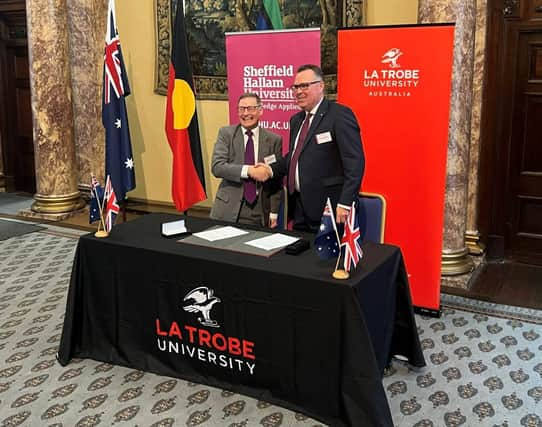New Global Security and Society Institute launches


Sheffield Hallam University and La Trobe University, Australia, launched the Global Security and Society Institute at Australia House in London.
Building on a well-established partnership between the two world-leading universities, researchers from both institutions will collaborate to bring together advanced technical expertise with humanitarian and social science perspectives – with a vision to develop more joint research and training in global security.
Advertisement
Hide AdAdvertisement
Hide AdThe Institute will use this distinctive perspective to work with governments, intelligence agencies, industry and others to address critical global security problems and enhance the capability to respond to new emerging challenges.
The partnership will also build extra capacity by expanding the network of experts and training the next generation of security academics, through joint international PhD programmes, teaching and learning at undergraduate and postgraduate level, and short courses.
Academics at both universities bring impressive track records in their respective fields.
Sheffield Hallam researchers from the Centre of Excellence in Terrorism, Resilience, Intelligence, and Organised Crime Research (CENTRIC) work with agencies and governments across the globe.
Advertisement
Hide AdAdvertisement
Hide AdThey developed an innovative digital tool that the UN is using to keep field staff safe during international conflicts. CENTRIC also advise governments and others on the use of surveillance applications, such as facial recognition, and the ethical implementation of AI in security, policing and justice.
La Trobe University’s research strengths in the humanities, most notably in international relations, foreign and defence policy will complement Sheffield Hallam’s strengths in terrorism and international conflict, generating new ideas, connections and opportunities.
Professor Sir Chris Husbands, Vice-Chancellor at Sheffield Hallam University, said: “As societies across the globe accelerate into the age of AI, big data, and seamless digital connectivity, it is imperative that we come together to pool our resources and consider how to tackle ever more complex security challenges.
“I’m delighted that we are working with our partners from La Trobe to do just that, helping communities deal with these problems by bringing together leading expertise from both institutions to work with governments and gencies.
Advertisement
Hide AdAdvertisement
Hide Ad“This is a great example of a genuinely internationally leading collaboration, whilst demonstrating both institutions commitment to advancing global research partnerships between the UK and Australia.”
Professor John Dewar, Vice-Chancellor at La Trobe University, said: “Now, more than ever, it’s imperative that transnational communities come together to share knowledge and expertise on pressing global security issues that affect us all.
“Our ambitious new Global Security and Society Institute, led jointly with our strategic partners at Sheffield Hallam University in the UK, will bring together fresh perspectives, world-leading research expertise and thought leadership to help governments, agencies and businesses navigate unprecedented challenges now and into the future.”
The new institute is part of a wider strategic partnership between Sheffield Hallam and La Trobe, which was reaffirmed during the signing ceremony.
Advertisement
Hide AdAdvertisement
Hide AdDignitaries representing the UK and Asia-Pacific included Dr Karen Salt, Deputy Director, R&I System Diversity and Security, UK Research and Innovation and Anushya Devendra, Head International Engagement, AUKUS Taskforce, Foreign, Commonwealth & Development Office (Australia).